(完整版)虚拟语气讲解和练习试题(含答案解析和解释)
- 格式:doc
- 大小:59.51 KB
- 文档页数:8
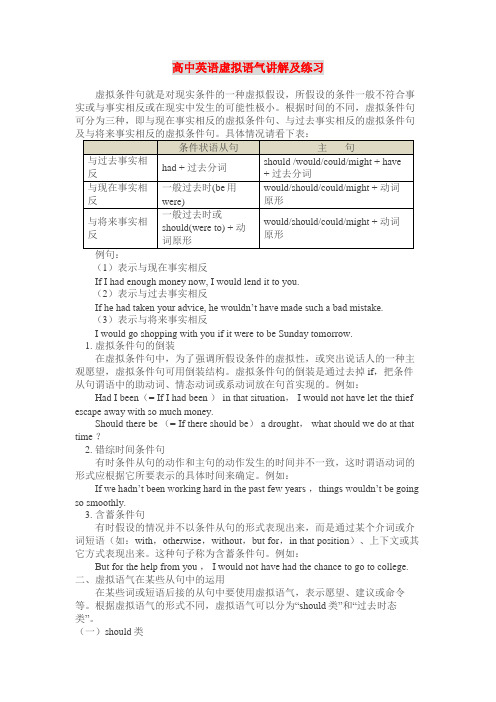
高中英语虚拟语气讲解及练习虚拟条件句就是对现实条件的一种虚拟假设,所假设的条件一般不符合事实或与事实相反或在现实中发生的可能性极小。
根据时间的不同,虚拟条件句可分为三种,即与现在事实相反的虚拟条件句、与过去事实相反的虚拟条件句(1)表示与现在事实相反If I had enough money now, I would lend it to you.(2)表示与过去事实相反If he had taken your advice, he wouldn’t have made such a bad mistake.(3)表示与将来事实相反I would go shopping with you if it were to be Sunday tomorrow.1. 虚拟条件句的倒装在虚拟条件句中,为了强调所假设条件的虚拟性,或突出说话人的一种主观愿望,虚拟条件句可用倒装结构。
虚拟条件句的倒装是通过去掉if,把条件从句谓语中的助动词、情态动词或系动词放在句首实现的。
例如:Had I been(= If I had been ) in that situation, I would not have let the thief escape away with so much money.Should there be (= If there should be) a drought, what should we do at that time ?2. 错综时间条件句有时条件从句的动作和主句的动作发生的时间并不一致,这时谓语动词的形式应根据它所要表示的具体时间来确定。
例如:If we hadn’t been working hard in the past few years ,thing s wouldn’t be going so smoothly.3. 含蓄条件句有时假设的情况并不以条件从句的形式表现出来,而是通过某个介词或介词短语(如:with,otherwise,without,but for,in that position)、上下文或其它方式表现出来。

高中英语虚拟语气讲解及练习虚拟条件句就是对现实条件的一种虚拟假设,所假设的条件一般不符合事实或与事实相反或在现实中发生的可能性极小。
根据时间的不同,虚拟条件句可分为三种,即与现在事实相反的虚拟条件句、与过去事实相反的虚拟条件句(1)表示与现在事实相反If I had enough money now, I would lend it to you.(2)表示与过去事实相反If he had taken your advice, he wouldn’t have made such a bad mistake.(3)表示与将来事实相反I would go shopping with you if it were to be Sunday tomorrow.1. 虚拟条件句的倒装在虚拟条件句中,为了强调所假设条件的虚拟性,或突出说话人的一种主观愿望,虚拟条件句可用倒装结构。
虚拟条件句的倒装是通过去掉if,把条件从句谓语中的助动词、情态动词或系动词放在句首实现的。
例如:Had I been(= If I had been ) in that situation, I would not have let the thief escape away with so much money.Should there be (= If there should be) a drought, what should we do at that time ?2. 错综时间条件句有时条件从句的动作和主句的动作发生的时间并不一致,这时谓语动词的形式应根据它所要表示的具体时间来确定。
例如:If we hadn’t been working hard in the past few years ,thing s wouldn’t be going so smoothly.3. 含蓄条件句有时假设的情况并不以条件从句的形式表现出来,而是通过某个介词或介词短语(如:with,otherwise,without,but for,in that position)、上下文或其它方式表现出来。
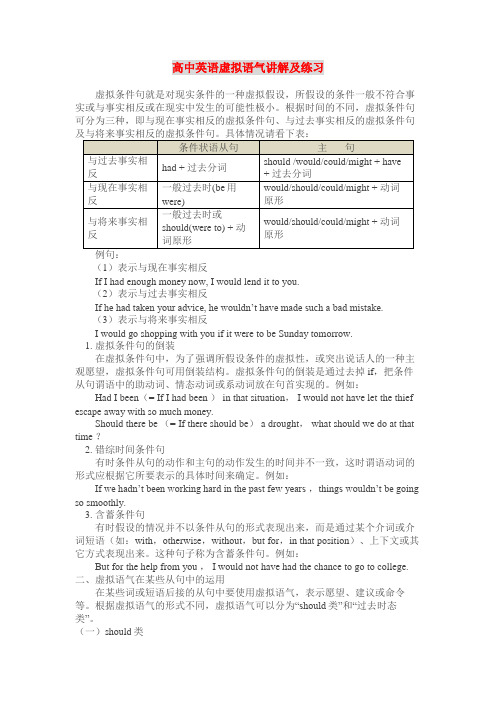
高中英语虚拟语气讲解及练习虚拟条件句就是对现实条件的一种虚拟假设,所假设的条件一般不符合事实或与事实相反或在现实中发生的可能性极小。
根据时间的不同,虚拟条件句可分为三种,即与现在事实相反的虚拟条件句、与过去事实相反的虚拟条件句(1)表示与现在事实相反If I had enough money now, I would lend it to you.(2)表示与过去事实相反If he had taken your advice, he wouldn’t have made such a bad mistake.(3)表示与将来事实相反I would go shopping with you if it were to be Sunday tomorrow.1. 虚拟条件句的倒装在虚拟条件句中,为了强调所假设条件的虚拟性,或突出说话人的一种主观愿望,虚拟条件句可用倒装结构。
虚拟条件句的倒装是通过去掉if,把条件从句谓语中的助动词、情态动词或系动词放在句首实现的。
例如:Had I been(= If I had been ) in that situation, I would not have let the thief escape away with so much money.Should there be (= If there should be) a drought, what should we do at that time ?2. 错综时间条件句有时条件从句的动作和主句的动作发生的时间并不一致,这时谓语动词的形式应根据它所要表示的具体时间来确定。
例如:If we hadn’t been working hard in the past few years ,thing s wouldn’t be going so smoothly.3. 含蓄条件句有时假设的情况并不以条件从句的形式表现出来,而是通过某个介词或介词短语(如:with,otherwise,without,but for,in that position)、上下文或其它方式表现出来。
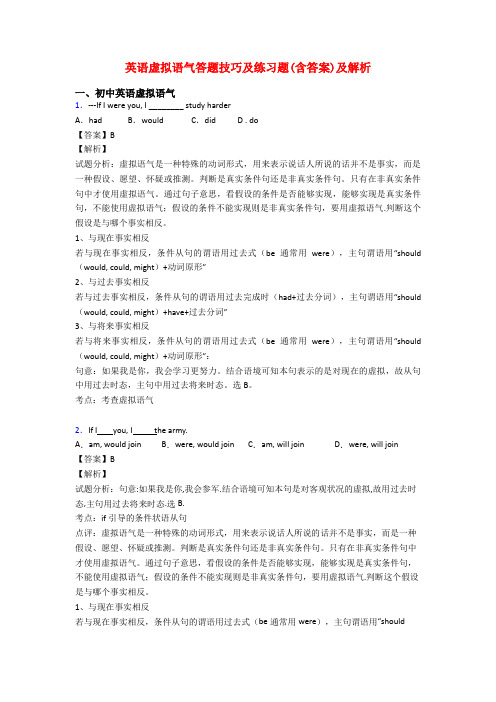
英语虚拟语气答题技巧及练习题(含答案)及解析一、初中英语虚拟语气1.---If I were you, I ________ study harderA.had B.would C.did D . do【答案】B【解析】试题分析:虚拟语气是一种特殊的动词形式,用来表示说话人所说的话并不是事实,而是一种假设、愿望、怀疑或推测。
判断是真实条件句还是非真实条件句。
只有在非真实条件句中才使用虚拟语气。
通过句子意思,看假设的条件是否能够实现,能够实现是真实条件句,不能使用虚拟语气;假设的条件不能实现则是非真实条件句,要用虚拟语气.判断这个假设是与哪个事实相反。
1、与现在事实相反若与现在事实相反,条件从句的谓语用过去式(be通常用were),主句谓语用“should (would, could, might)+动词原形”2、与过去事实相反若与过去事实相反,条件从句的谓语用过去完成时(had+过去分词),主句谓语用“should (would, could, might)+have+过去分词”3、与将来事实相反若与将来事实相反,条件从句的谓语用过去式(be通常用were),主句谓语用“should (would, could, might)+动词原形”:句意:如果我是你,我会学习更努力。
结合语境可知本句表示的是对现在的虚拟,故从句中用过去时态,主句中用过去将来时态。
选B。
考点:考查虚拟语气2.If I you, I the army.A.am, would join B.were, would join C.am, will join D.were, will join【答案】B【解析】试题分析:句意:如果我是你,我会参军.结合语境可知本句是对客观状况的虚拟,故用过去时态,主句用过去将来时态.选B.考点:if引导的条件状语从句点评:虚拟语气是一种特殊的动词形式,用来表示说话人所说的话并不是事实,而是一种假设、愿望、怀疑或推测。

(英语)英语虚拟语气题20套(带答案)含解析一、初中英语虚拟语气1.If I ______ you, I ______invite him to go to see a movie.A.am;would B.were;will C.were;would D.was;will【答案】C【解析】试题分析:句意:如果我是你,我会邀请他去看电影。
go to see a movie去看电影;invite sb to do邀请某人做某事;在表达与现在事实相反的虚拟语气中,Be用were,主句用would。
考点:考查虚拟语气。
2.Mr. White _____ at 8:30 for the meeting, but he didn't show up.A.should have arrived B.should arriveC.should have had arrived D.should be arriving【答案】A【解析】试题分析:句意:怀特先生本来应该在8:30到会,但他却没有出现。
should have done:本来应该做某事而实际上没做。
故选A考点:情态动词3.The workers insisted that they a free lunch every noon and the boss hadto do that.A.be given B.being given C.will be to give D.were given【答案】A【解析】句意:工人们坚持要求他们每天中午都有免费的午餐,老板必须这样做。
考查虚拟语气。
insist坚持,要求,其后面的宾语从句要用虚拟语气,跟虚拟式动词原形或者“sh ould + 动词原形” 。
结合句意和语境可知选A。
4.--What would you do if you ____ a million dollars?--I’d give it to the charityA.win B.won C.will win D.is to win【答案】B【解析】试题分析:句意:如果你赢了一百万美元,你要做什么?——我会把它捐给慈善机构。

初中英语虚拟语气题20套(带答案)含解析一、初中英语虚拟语气1.If I _______ you, I _______ go there.A.is; will B.is; would C.were; would D.was; will【答案】C【解析】本题考查虚拟语气,if引导的与现在事实相反的虚拟语气。
从句用一般过去式,主句用过去将来时。
句意:如果我是你的话,我会去那儿的。
1.57.---What would you do if you a million dollars?---If I you, I’d give it to medical research.A.got, were B.win, am C.won, am D.get, were【答案】A【解析】本题是考查的虚拟语气,对于将来的假设,主句用过去将来时,从句用一般过去时,且be动词为were,故选A2.58.What _____ you _____ if you had a million dollars?A.would, did B.will, do C.would, do D.will, did【答案】C【解析】本题是对于虚拟语气的特殊疑问句的考查,根据句子的结构,选C2.--- If I_______ one million dollars, I would give it to medical research.---If I _______ you, I would give it to charity.A.will have, am B.would have, was C.had, were D.have, is【答案】C【解析】考察虚拟语气。
第一空,虚拟语气,与现在相反,用过去时。
第二空,虚拟语气,与现在相反,用过去时,be动词用were。
故选C3.--What would you do if you ____ a million dollars?--I’d give it to the charityA.win B.won C.will win D.is to win【答案】B【解析】试题分析:句意:如果你赢了一百万美元,你要做什么?——我会把它捐给慈善机构。

虚拟语气简介虚拟语气用来表示说话人的主观愿望或假想,而不表示客观存在的事实,所说的是一个条件,不一定是事实,或与事实相反。
虚拟语气通过谓语动词的特殊形式来表示。
英语中的语气分为陈述语气、祈使语气、虚拟语气三类。
在表示虚假的、与事实相反的或难以实现的情况时用虚拟语气,表示主观愿望或某种强烈情感时,也用虚拟语气。
即当一个人说话时欲强调其所说的话是基于自己的主观想法,愿望,假想,猜测,怀疑或建议,而不是根据客观实际,就用虚拟语气。
①错综时间条件句:当条件状语从句表示的行为和主句表示的行为所发生的时间不一致时,被称为错综时间条件句,动词的形式要根据它表示的时间作出相应的调整。
如:If you had followed my advice just now, you would be better now.If you had studied hard before, you would be a college student now.②if省略句在条件句中可以省略if, 把were, had, should提到句首,变成倒装句式。
如:If I were at school again, I would study harder.→Were I at school again, I would study harder.如果我还有上学的机会,我会更加努力学习。
If you had come earlier, you would catch the bus.→Had you come earlier, you would catch the bus.如果你来得早点,你就能赶上公共汽车。
If it should rain tomorrow, we would not go climbing.→Should it rain tomorrow, we would not go climbing.如果明天下雨的话,我们就不能登山去了。
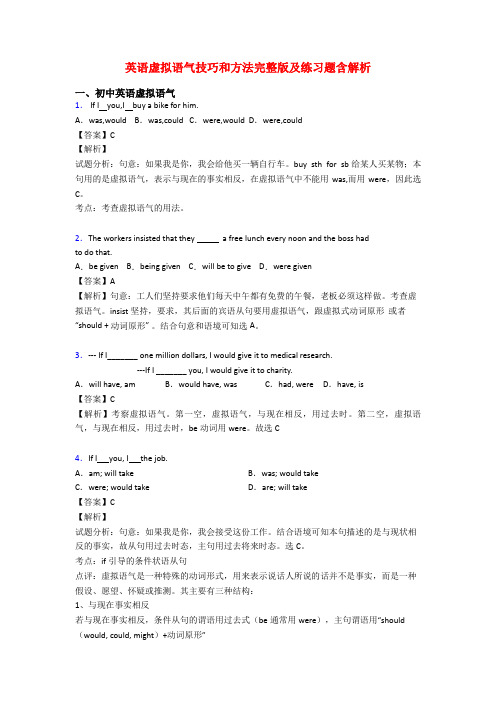
英语虚拟语气技巧和方法完整版及练习题含解析一、初中英语虚拟语气1. If I you,I buy a bike for him.A.was,would B.was,could C.were,would D.were,could【答案】C【解析】试题分析:句意:如果我是你,我会给他买一辆自行车。
buy sth for sb给某人买某物;本句用的是虚拟语气,表示与现在的事实相反,在虚拟语气中不能用was,而用were,因此选C。
考点:考查虚拟语气的用法。
2.The workers insisted that they a free lunch every noon and the boss hadto do that.A.be given B.being given C.will be to give D.were given【答案】A【解析】句意:工人们坚持要求他们每天中午都有免费的午餐,老板必须这样做。
考查虚拟语气。
insist坚持,要求,其后面的宾语从句要用虚拟语气,跟虚拟式动词原形或者“should + 动词原形” 。
结合句意和语境可知选A。
3.--- If I_______ one million dollars, I would give it to medical research.---If I _______ you, I would give it to charity.A.will have, am B.would have, was C.had, were D.have, is【答案】C【解析】考察虚拟语气。
第一空,虚拟语气,与现在相反,用过去时。
第二空,虚拟语气,与现在相反,用过去时,be动词用were。
故选C4.If I you, I the job.A.am; will take B.was; would takeC.were; would take D.are; will take【答案】C【解析】试题分析:句意:如果我是你,我会接受这份工作。

虚拟语气讲解及练习一.非真实条件句的虚拟情况:1.与现在事实相反的条件e.g. If I were you, I would go at once.If I had HIV, I would know because I would feel sick.2.与过去事实相反e.g. If you had come a few minutes earlier, you would have met him.If she had told him about the danger, he would not have hurt.3.与将来事实相反e.g. If it were sunny tomorrow, I would come to see you.If he should fail in the experiment this time, he would try again.If we were to panic(受惊,惊慌), we should not be able to help.4.混合时间条件句:主从句不一定用指同一时间的动词。
即:假设条件从句谓语动词发生的时间与主句所假设的谓语动词不一致,叫做混合虚拟语气(错综条件虚拟语气)。
主句和从句的谓语动词要依照假设的时间而定。
e.g. If you ____that late movie last night, you wouldn’t be so sleepy.A.haven’t watchedB.didn’t watchC. hadn’t watchedD.wouldn’t watchedIf Paul had received six more votes in the last election, he would be our chairman now.If the weather had been finer, the crops would be growing still better.If you had followed the teacher’s advice, you wouldn’t be in the hospital.e.g If I had gone to a key university, I would earn more money now.5.含蓄条件句:有时假设的条件不通过条件从句表示而含蓄在介词短语或上下文中。

高中英语虚拟语气讲解及练习虚拟条件句就是对现实条件的一种虚拟假设,所假设的条件一般不符合事实或与事实相反或在现实中发生的可能性极小。
根据时间的不同,虚拟条件句可分为三种,即与现在事实相反的虚拟条件句、与过去事实相反的虚拟条件句(1)表示与现在事实相反If I had enough money now, I would lend it to you.(2)表示与过去事实相反If he had taken your advice, he wouldn’t have made such a bad mistake.(3)表示与将来事实相反I would go shopping with you if it were to be Sunday tomorrow.1. 虚拟条件句的倒装在虚拟条件句中,为了强调所假设条件的虚拟性,或突出说话人的一种主观愿望,虚拟条件句可用倒装结构。
虚拟条件句的倒装是通过去掉if,把条件从句谓语中的助动词、情态动词或系动词放在句首实现的。
例如:Had I been(= If I had been ) in that situation, I would not have let the thief escape away with so much money.Should there be (= If there should be) a drought, what should we do at that time ?2. 错综时间条件句有时条件从句的动作和主句的动作发生的时间并不一致,这时谓语动词的形式应根据它所要表示的具体时间来确定。
例如:If we hadn’t been working hard in the past few years ,thing s wouldn’t be going so smoothly.3. 含蓄条件句有时假设的情况并不以条件从句的形式表现出来,而是通过某个介词或介词短语(如:with,otherwise,without,but for,in that position)、上下文或其它方式表现出来。
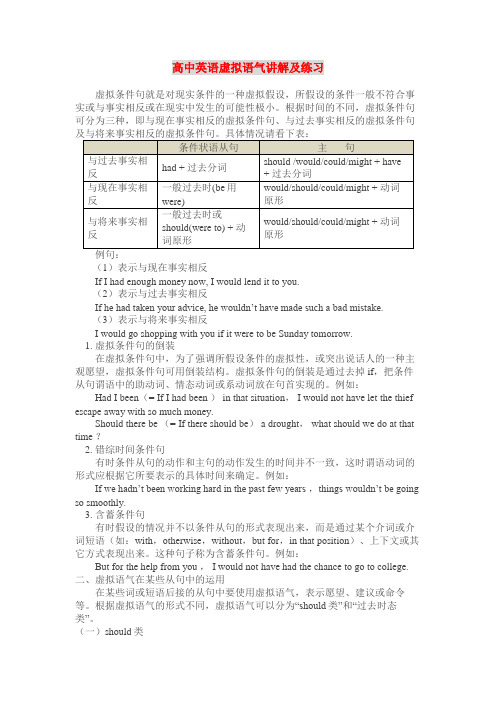
高中英语虚拟语气讲解及练习虚拟条件句就是对现实条件的一种虚拟假设,所假设的条件一般不符合事实或与事实相反或在现实中发生的可能性极小。
根据时间的不同,虚拟条件句可分为三种,即与现在事实相反的虚拟条件句、与过去事实相反的虚拟条件句(1)表示与现在事实相反If I had enough money now, I would lend it to you.(2)表示与过去事实相反If he had taken your advice, he wouldn’t have made such a bad mistake.(3)表示与将来事实相反I would go shopping with you if it were to be Sunday tomorrow.1. 虚拟条件句的倒装在虚拟条件句中,为了强调所假设条件的虚拟性,或突出说话人的一种主观愿望,虚拟条件句可用倒装结构。
虚拟条件句的倒装是通过去掉if,把条件从句谓语中的助动词、情态动词或系动词放在句首实现的。
例如:Had I been(= If I had been ) in that situation, I would not have let the thief escape away with so much money.Should there be (= If there should be) a drought, what should we do at that time ?2. 错综时间条件句有时条件从句的动作和主句的动作发生的时间并不一致,这时谓语动词的形式应根据它所要表示的具体时间来确定。
例如:If we hadn’t been working hard in the past few years ,thing s wouldn’t be going so smoothly.3. 含蓄条件句有时假设的情况并不以条件从句的形式表现出来,而是通过某个介词或介词短语(如:with,otherwise,without,but for,in that position)、上下文或其它方式表现出来。

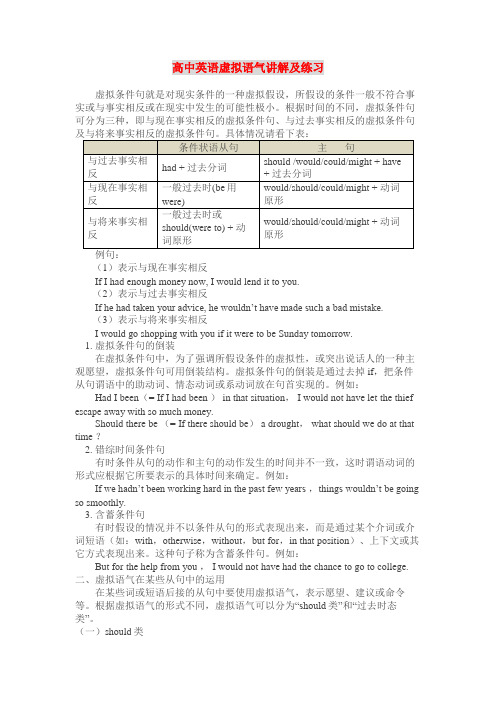
高中英语虚拟语气讲解及练习虚拟条件句就是对现实条件的一种虚拟假设,所假设的条件一般不符合事实或与事实相反或在现实中发生的可能性极小。
根据时间的不同,虚拟条件句可分为三种,即与现在事实相反的虚拟条件句、与过去事实相反的虚拟条件句(1)表示与现在事实相反If I had enough money now, I would lend it to you.(2)表示与过去事实相反If he had taken your advice, he wouldn’t have made such a bad mistake.(3)表示与将来事实相反I would go shopping with you if it were to be Sunday tomorrow.1. 虚拟条件句的倒装在虚拟条件句中,为了强调所假设条件的虚拟性,或突出说话人的一种主观愿望,虚拟条件句可用倒装结构。
虚拟条件句的倒装是通过去掉if,把条件从句谓语中的助动词、情态动词或系动词放在句首实现的。
例如:Had I been(= If I had been ) in that situation, I would not have let the thief escape away with so much money.Should there be (= If there should be) a drought, what should we do at that time ?2. 错综时间条件句有时条件从句的动作和主句的动作发生的时间并不一致,这时谓语动词的形式应根据它所要表示的具体时间来确定。
例如:If we hadn’t been working hard in the past few years ,thing s wouldn’t be going so smoothly.3. 含蓄条件句有时假设的情况并不以条件从句的形式表现出来,而是通过某个介词或介词短语(如:with,otherwise,without,but for,in that position)、上下文或其它方式表现出来。
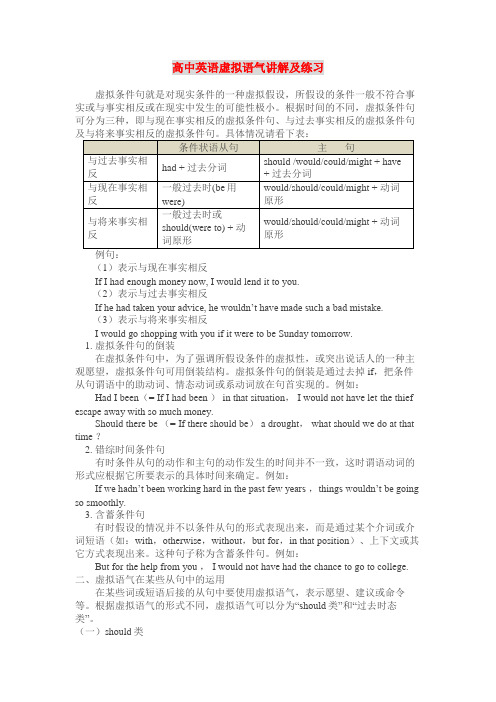
高中英语虚拟语气讲解及练习虚拟条件句就是对现实条件的一种虚拟假设,所假设的条件一般不符合事实或与事实相反或在现实中发生的可能性极小。
根据时间的不同,虚拟条件句可分为三种,即与现在事实相反的虚拟条件句、与过去事实相反的虚拟条件句(1)表示与现在事实相反If I had enough money now, I would lend it to you.(2)表示与过去事实相反If he had taken your advice, he wouldn’t have made such a bad mistake.(3)表示与将来事实相反I would go shopping with you if it were to be Sunday tomorrow.1. 虚拟条件句的倒装在虚拟条件句中,为了强调所假设条件的虚拟性,或突出说话人的一种主观愿望,虚拟条件句可用倒装结构。
虚拟条件句的倒装是通过去掉if,把条件从句谓语中的助动词、情态动词或系动词放在句首实现的。
例如:Had I been(= If I had been ) in that situation, I would not have let the thief escape away with so much money.Should there be (= If there should be) a drought, what should we do at that time ?2. 错综时间条件句有时条件从句的动作和主句的动作发生的时间并不一致,这时谓语动词的形式应根据它所要表示的具体时间来确定。
例如:If we hadn’t been working hard in the past few years ,thing s wouldn’t be going so smoothly.3. 含蓄条件句有时假设的情况并不以条件从句的形式表现出来,而是通过某个介词或介词短语(如:with,otherwise,without,but for,in that position)、上下文或其它方式表现出来。
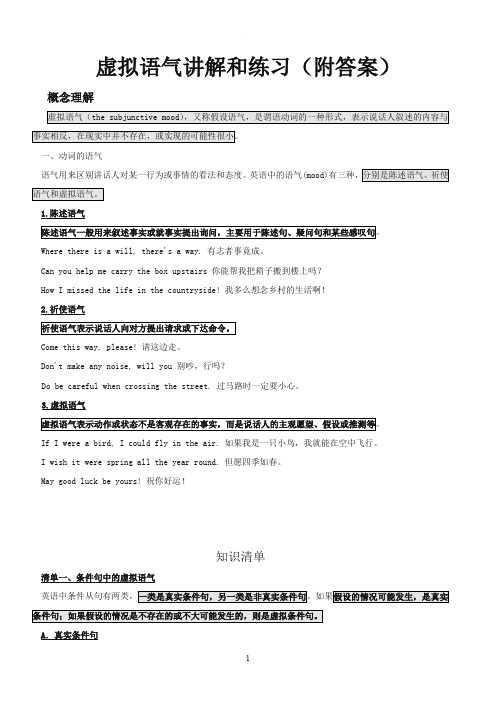
虚拟语气讲解和练习(附答案)概念理解一、动词的语气语气用来区别讲话人对某一行为或事情的看法和态度。
英语中的语气(mood)1.陈述语气Where there is a will, there's a way. 有志者事竟成。
Can you help me carry the box upstairs 你能帮我把箱子搬到楼上吗?How I missed the life in the countryside! 我多么想念乡村的生活啊!2.祈使语气Come this way, please! 请这边走。
Don't make any noise, will you 别吵,行吗?Do be careful when crossing the street. 过马路时一定要小心。
3.虚拟语气If I were a bird, I could fly in the air. 如果我是一只小鸟,我就能在空中飞行。
I wish it were spring all the year round. 但愿四季如春。
May good luck be yours! 祝你好运!知识清单清单一、条件句中的虚拟语气A.真实条件句If he doesn't come at 8, we won't wait for him. 如果他八点不来,我们就不等他了。
If a flood happened in the past, there was usually a great loss of life and property. 过去发生洪水的话,常有很大的生命和财产损失。
We shall go there unless it rains tomorrow. 如果明天不下雨,我们将去那里。
I'll let you use my bike on condition that you keep it clean. 如果你能保持车子干净,我就让你用我的自行车。

虚拟语气一、考点聚焦1、虚拟语气用于条件状语从句中(1)表示与现在事实相反的假设,条件状语从句中的谓语动词用“过去式(be动词的过去式用were)”,而主句中的谓语动词用“would / should/ could / might + 动词原形”。
如:If I were a boy, I would join the army.If the had time, she should go with you.(2)表示与过去的事实相反,条件状语从句中的谓语动词用过去完成时,主句中的谓语动词则用“would / should / might / could + have +过去分词”。
如:If he had taken my advice, he would have succeeded in the competition.(3)表示与将来事实相反,条件状语从句中的谓语动词一般过去时或should(were to) + 动词原形,而主句中的谓语动词则用would / should/could might + 动词原形。
如;If it were to rain tomorrow, the football match would be put off.(4)当条件状语从句表示的行为和主句表示的行为所发生的时间不一致时,动词的形式要根据它所表示的时间作相应调整。
如:If they had worked hard, they would be very tired.(从句说的是过去,主句指的是现在)Were I a boy, I would join the army.Had he taken my advice, he would have succeeded.Were it not for the expense, I would go to Britain.2、虚拟语气用于名词性从句(1)虚拟语气在宾语从句中的运用。

情态动词、虚拟语气60 题1. —— Don’ t forget to bring my new books tomorrow afternoon.—— No, I _______.A. don ’ tB. can’ tC. won’ tD. couldn’ t2. —— I hear you’ ve got a set of Australian coins.___I have a look?—— Yes, certainly.A. DoB. MayC.ShallD. Should3.He seldom listens to others. He _____ answer for what he has done. A.shall B. will C. can D. would4. —— May I leave the office before 5 o’ clock in the afternoon?—— No, I ’ m afraid you_______ .A. needn ’ tB. shouldn’ tC. mustn'tD. won’ t5. —— Shall I tell John about it?—— No, you ____ . I don ’ t know his telephone number.A. needn ’ tB. wouldn’ tC. mustn’ tD. shouldn’ t6.Mr Bush is on time for everything.___it be that he was late for the opening ceremony? How A. can B. should C. may D. must7. The traffic light is red, so I______stop my car.A. mustB. have toC. canD. mustn’ t8. —— What happened to the young trees we planted?—— The trees ______ well, but I didn ’ t water them.A. might growB. needn ’ t have grownC. would growD. would have grown9. I was really anxious about you. You ___ home without a word.A. mustn ’ t leaveB. shouldn ’ t have leftC. couldn ’ t have leftD. needn ’ t leave10. Children ________ in public very often.A. should be praisedB. shouldn ’ t have praisedC. shouldn’ t have ben praisedD. shouldn’ t be praised11. Let’ s clean the classroom,_______?A. won ’ t youB. shall weC. do weD. will not you12.Tom _______ show his exam results to his parents.A. dare notB. daredC. dare toD. dares not to13. I don’ t think he_______ a new bike.A. need to buyB. needs buyC. needD. need buy14. —— Nacy _________the letter from her mother.—— No, she can’ t have. The postman hasn’ t come yet.A. can receiveB. can have receivedC. must have receivedD. must receive15. She ________the film. She knows nothing about it.A. can ’ t seeB. can’ t have seenC. must seeD. mustn’ t have seen16. They must have been here the day before yesterday,____?A. mustn ’ t theyB. didn’ t theyC. mustn ’ t have theyD. had they17. —— I didn’eetsher yesterday.—— Oh, but you_______________.A. must haveB. ought toC. should haveD. cannot have18. —— Must I take a bus ?—— No, you ____ . You can walk from here.A. must notB. don’ tC. don ’ t have toD. had better not to19. —— Why do you make me do so?—— I am sorry that you________do such a thing.A. wouldB. canC. shouldD. may20. —— Will you stay for lunch?—— Sorry,_____. My brother is coming to see me.A. I mustn ’ tB. I can’ tC. I needn’ tD. ?won’ t21.What would have happened ____ , as far as the river bank? A.if Bob has walked fartherB. if Bob should walk fartherC. had Bob walked fartherD. if Bob walked farther22. You didn’ t let me drive. If we____in turn, you___so tired.A. drove ; didn ’ t getB. drove; wouldn ’ t etgC. were driving;wouldn’t getD. had driven;wouldn’t have got23. Without electricity human life_______quite different today.A. isB. will beC. would have beenD. would be24. Oh, Janne, you’ ve broken another glass. You ought____when you washed it.A. be carefulB. to careC. have caredD. to have been careful25. I ______often go fishing when I lived in the countryside.A. shouldB. wouldC. couldD. might26. He ______ rather stay at home than go to the cinema with you.A. shouldB. mightC. wouldD. had better27. It’ s high time we_______to the theater.A. willB. shallC. are going toD. went28. —— Could I use your telephone?—— Yes, of course you_____________.A. couldB. willC. canD. might29. It’ s strange that they_____nothing about this matter.A. knowB. would knowC. knowsD. knew30.I wish you ______ go with me tomorrow. A.will B. would C. shall D. can31.—— Do you still remember the day when we went to the Great Wall?—— I can ’ t remember it well, but______ sometime last autumn?A. might it beB. could it have beenC. could it beD. must it have been32. —— I can ’ t get through to the general manager’ s office anyhow.—— The line is busy. Someone_____the telephone.A. must useB. usesC. must have been usingD. must be using33.He suggests we ______ to the cinema at once, otherwise we will be late.A .must go B. go C. will go D. would go34. When a pencil is partly in a glass of water, it looks as if____.A. breaksB. has brokenC. were brokenD. had been broken35. The general ordered that the thief____.A. be punishedB. would punishC. would be punishedD. should punish36. If only I _____ how to operate a computer as you do!A. had knownB. wou欤?knowC. should knowD. knew37.It is surprising that he ____ at the meeting. A.was B. be C. is D. were38. If you ____ wait a moment, I’ ll go and find our manager.A. canB. shouldC. willD. must39. —— Do you think he will do me a favor?—— As far as I know, he is the last one to help others. He____be prepared to give you a hand, though.A. mightB. mustC. canD. should40. Even though I’ d hurt my leg,______I swim back to the river bank.A. couldB. mightC. had toD. was able to41. You _______go to the party if you don’ t finish your homework first.A. won ’ tB. don’ tC. oughtn’ tD. shan’ t42. —— It is rather cold here. Shall we light a fire?—— No, we ______ because things are easy to catch fire.A. won ’ tB. can’ tC. mustn’ tD. needn’ t43.I ______ Professor Jones had taught me this question.A. believeB. deeply thinkC. wishD. suppose44. The chairman requested that___________.A. the members studied the problem more carefullyB. the problems were more carefully studiedC. the problems could be studied with more careD. the members study the problem more carefully45. I ______it again.A. would like you to readB. would like that you readC. would like you readingD. would like you read46. If you really want yourself to be in good health, you must___always___so much.A. not ; be smokingB. not;have smokedC. not ; to smokeD. be not;smoking47.If I ___ you, I ____ more attention to English idioms and phrases.A. was ; shall payB. am ; will payC. would be ; would payD. were;would pay48.“ Would you have told him the answer had it been possible?”“ I would have, but I ____ so busy then. ”A. had beenB. wereC. wasD. would be49.He had an expression of resentment (不高兴) , as if Martin ___ a fool of him. A.had made B. makesC. madeD. would make50.____ the fog, we should have reached our school.A. Because ofB. In spite ofC. In case ofD. But forcountry.A. wasB. should beC. would beD. were52. We all agreed to her suggestion that we______to the Great Wall for sightseeing(观光).A. will goB. goC. shall goD. should have gone53. You must be a student,________you?A. wasn ’ tB. areC. mustn’ tD. aren’ t54. The young man insisted that he_____nothing wrong and___free.A. did ; setB. had done;should be setC. do ; be setD. had done;must be set55.Without your help, I ____ the exam last term. A.failed in B. would have failedC. wouldn ’ t passD. would fail56._____ he come, the problem would be settled.A. WouldB. ShouldC. ShallD. If57.Very loud noise _____ make people ill or drive them mad. A.should B. can C. need D. must58. I lost your address, otherwise I____you long before.A. had visitedB. have visitedC. would have visitedD. should visit59.—— Where ________ ?—— I got stuck in the heavy traffic, or I_____here earlier.A. did you go;had arrivedB. are you ; would comeC. were you; would comeD. have you been;would have been60.I ________ you a beautiful present for your birthday,but I was short of money at that time.A. would buyB. had boughtC. would like to havebought D. must have bough参考答案及解析1.C 。


(完整版)虚拟语气讲解及练习题(含答案和解释)虚拟语气讲解与练习黄志刚2013.10.一. 简介虚拟语气用来表示说话人的主观愿望或假想,而不表示客观存在的事实,所说的是一个条件,不一定是事实,或与事实相反。
虚拟语气通过谓语动词的特殊形式来表示。
英语中的语气分为陈述语气、祈使语气、虚拟语气在什么情况下用虚拟语气? 在表示虚假的、与事实相反的或难以实现的情况时用虚拟语气,表示主观愿望或表示某种强烈情感时,也用虚拟语气。
即当一个人说话时欲强调其所说的话是基于自己的主观想法,而不是根据客观实际,就用虚拟语气。
二. 虚拟语气在非真实条件状语从句中的用法1、真实条件状语从句与非真实条件状语从句真:eg . If he doesn’t hurry up, he will miss the bus. 如果他不快点,他将错过巴士。
( 真实条件状语)(不是虚拟语气)If he is free, he will ask me to tell stories. 如果他是空闲的,他会要求我讲故事。
(真实条件状语)(不是虚拟语气)非真:eg. If I were you, I would go at once.如果我是你,我马上就会去。
(非真实条件状语从句)If there were no air, people would die. 如果没有空气,人就会死亡。
(非真实条件状语从句)2、用法及动词形式1、表示与现在事实相反的情况,例1.If I were you, I would take an umbrella.如果我是你,我会带把伞。
(事实:我不可能是你) 2.If I knew his telephone number, I would tell you. 如果我知道他的电话号码,我就会告诉你。
(事实:不知道) 3.If there were no air orwater, there would be no living things on the earth. 如果没有水和空气,地球上就不会有生物。
一. 简介虚拟语气用来表示说话人的主观愿望或假想,而不表示客观存在的事实,所说的是一个条件,不一定是事实,或与事实相反。
虚拟语气通过谓语动词的特殊形式来表示。
英语中的语气分为陈述语气、祈使语气、虚拟语气三类。
二. 应用条件虚拟语气常在表示条件和结果的状语从句中。
在表示与事实相反的虚拟语气时动词有三种时态:现在时,过去时,将来时,过去完成时,现在完成时。
在条件句中的应用:条件句可分为两类,一类为真实条件句,一类为非真实条件句。
非真实条件句表示的是假设的或实际可能性不大的情况,故采用虚拟语气。
虚拟语气在什么情况下用虚拟语气? 在表示虚假的、与事实相反的或难以实现的情况时用虚拟语气,表示主观愿望或表示某种强烈情感时,也用虚拟语气。
即当一个人说话时欲强调其所说的话是基于自己的主观想法,而不是根据客观实际,就用虚拟语气。
三. 虚拟语气在非真实条件状语从句中的用法1、真实条件状语从句与非真实条件状语从句真eg . If he doesn’t hurry up, he will miss the bus. 如果他不快点,他将错过巴士。
( 真实条件状语)(不是虚拟语气)If he is free, he will ask me to tell stories. 如果他是空闲的,他会要求我讲故事。
(真实条件状语)(不是虚拟语气)非真 eg. If I were you, I would go at once.如果我是你,我马上就会去。
(非真实条件状语从句)If there were no air, people would die. 如果没有空气,人就会死亡。
(非真实条件状语从句)2、用法及动词形式1、表示与现在事实相反的情况:if+主语+过去时+其他+主语+should/would/could/might+do+其他例: 1.If I were you, I would take an umbrella.如果我是你,我会带把伞。
(事实:我不可能是你) 2.If I knew his telephone number, I would tell you. 如果我知道他的电话号码,我就会告诉你。
(事实:不知道) 3.If there were no air or water, there would be no living things on the earth. 如果没有水和空气,地球上就不会有生物。
(事实:地球上既有空气也有水) 4.If I had any money with me, I could lend you some. 如果我带钱了,我就会借给你些。
(事实:没带钱) 5.If he studied harder, he might pass the exam.如果他再努力些,就能通过考试了。
(事实:没有努力2、表示与过去事实相反的情况if+主语+had done +其他+主语+should/would/could/might+have done+其他例: 1. If I had got there earlier, I should/could have met her. 如果我早到那儿,我就会见到她。
(事实:去晚了) 2.If he had taken my advice, he would not have made such a mistake. 如果他听我的劝告的话,就不会犯这样的错误了。
(事实:没有听我的话)3、表示对将来情况的主观推测①if+主语+were to do+sth.+主语+should/would/could/might+do+其他②if+主语+did/be(were)+sth.+主语+should/would/could/might+do+其他③if+主语+should+do+sth.+主语+should/would/could/might+do+其他例: 1.If he should come here tomorrow, I should/would talk to him. 如果他哪天来这儿的话,我就跟他谈谈。
(事实:来的可能性很小) 2.If there were a heavy snow next Sunday, we would not go skating. 如果下周日下大雪,我们就不能去滑冰了。
(事实:不知能否下雪) 3.If she were to be there next Monday, I would tell her about the matter. 如果她下周一来这儿的话,我就会告诉她这件事的始末。
在表示建议、命令、要求等含义的宾语从句,谓语动词常用虚拟语气,"should+动词原形"构成,should 可省略。
4、有时,虚拟条件句中,结果主句和条件从句的谓语动作若不是同时发生时,虚拟语气的形式应作相应的调整。
①从句的动作与过去事实相反,而主句的动作与现在或现在正在发生的事实不符。
如:If I had worked hard at school, I would be an engineer, too. 如果我在学校学习刻苦的话,我现在也会成为一个工程师了If they had informed us, we would not come here now. 如果他们通知过我们的话,我们现在就不会来这里了。
②从句的动作与现在事实相反,而主句的动作与过去事实不符。
如:If he were free today, we would have sent him to Beijing. 如果他今天有空的话,我们会已经派他去北京了。
If he knew her, he would have greeted her. 要是他认识她的话,他肯定会去问候她了。
③从句的动作与过去发生的情况相反,而主句的动作与现在正在发生的情况相反。
如:If it had not been raining too much, the crops would be growing much better. 如果天不下太多的雨的话,庄稼会长得更好。
If he had been working hard, he would be working in the office now. 要是他一直努力工作的话,他现在已进了办公室了。
5、当虚拟条件句的谓语动词含有were, should, had时,if可以省略,这时条件从句要用倒装语序,即将were, should, had等词置于句首,这种多用于书面语。
如:Should he agree to go there, we would send him there. 要是他答应去的话,我们就派他去。
Were she here, she would agree with us. 如果她在这儿的话,她会同意我们的。
Had he learnt about computers, we would have hired him to work here. 如果她懂一些电脑知识的话,我们已经聘用他来这里工作了。
6、非真实条件句中的条件从句有时不表达出来,只暗含在副词、介词短语、上下文或其他方式表示出来,这种句子叫做含蓄条件句,在多数情况下,条件会暗含在短语中,如without…., but for….等But for his help, we would be working now. 要不是他的帮助,我们还会在工作呢。
Without your instruction, I would not have made such great progress. 要是没有你的指导,我不会取得如此大的进步。
We didn’t know his telephone number; otherwise we would have telephoned him. 我们不知道他的电话号码,否则我们就会给他打电话。
7、有时,虚拟条件句中,主、从句可以省略其中的一个,来表示说话人的一种强烈的感情。
①省略从句He would have finished it. 他本该完成了。
You could have passed this exam. 你应该能通过这次考试了。
②省略主句If I were at home now. 要是我现在在家里该多好啊。
If only I had got it. 要是我得到它了该多好啊。
、虚拟语气(Subjunctive Mood)的其他用法1、虚拟语气用在wish 后的宾语从句a、表示与现在事实相反的愿望,谓语动词用过去式eg. I wish I had your brains.我希望我有你那样的头脑。
(事实:我根本比不上你)b、表示与过去事实相反的愿望,谓语动词:had+done(动词过去分词)eg:.I wish I had known the truth of the matter.我希望我原来知道这件事的真相。
(事实:原来不知道)c、表示将来难以实现的愿望谓语动词:should/would + 动词原形eg. I wish I should have a chance again.我希望我还能有一次这样的机会。
(事实:很难再有这样的机会了)(注:if only和as if/as though也有相同用法)2、虚拟语气用在目的状语从句中1.在for fear that, in case, lest引导的,若用虚拟语气时,从句谓语为:should + 动词原形。
并且 should不能省略She examined the door again for fear that a thief should come in. 她又把门检查了一遍,以防盗贼的进入。
He started out earlier lest he should be late. 他很早就出发了以防迟到。
2、在so that, in order that所引导的目的状语从句中,从句中的谓语为:can / may / could / might / will / would / should + 动词原形。
He goes closer to the speaker so that he can hear him clearer. 他走近说话的人以便能听得更清楚。
He read the letter carefully in order that he should not miss a word. 他把信读得很仔细以便不漏掉一个单词。
3、虚拟语气的其他用法1、一想要(desire)二宁愿(prefer)三命令(order. command)四建议(advice. suggest. propose)五要求(demand. require. request. desire.insist)中,无论主句谓语动词为何种时态,从句的谓语动词都用:“should + 动词原形”或只用“动词原形”。